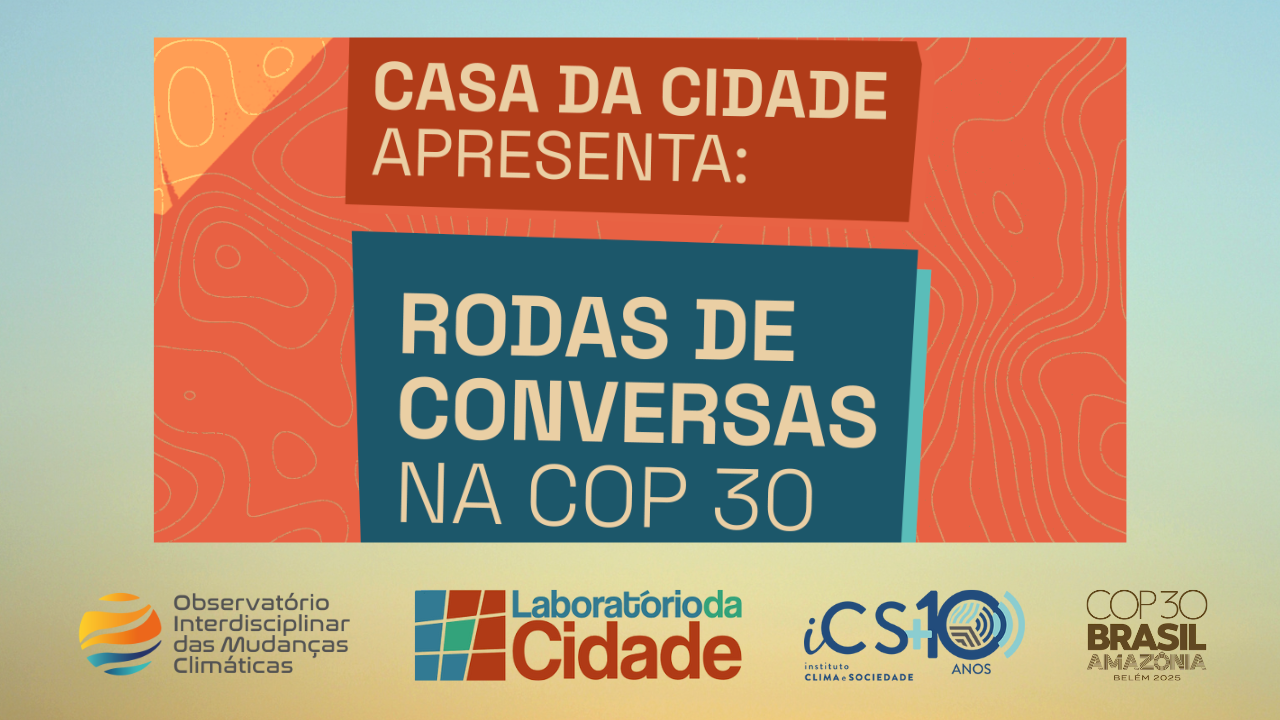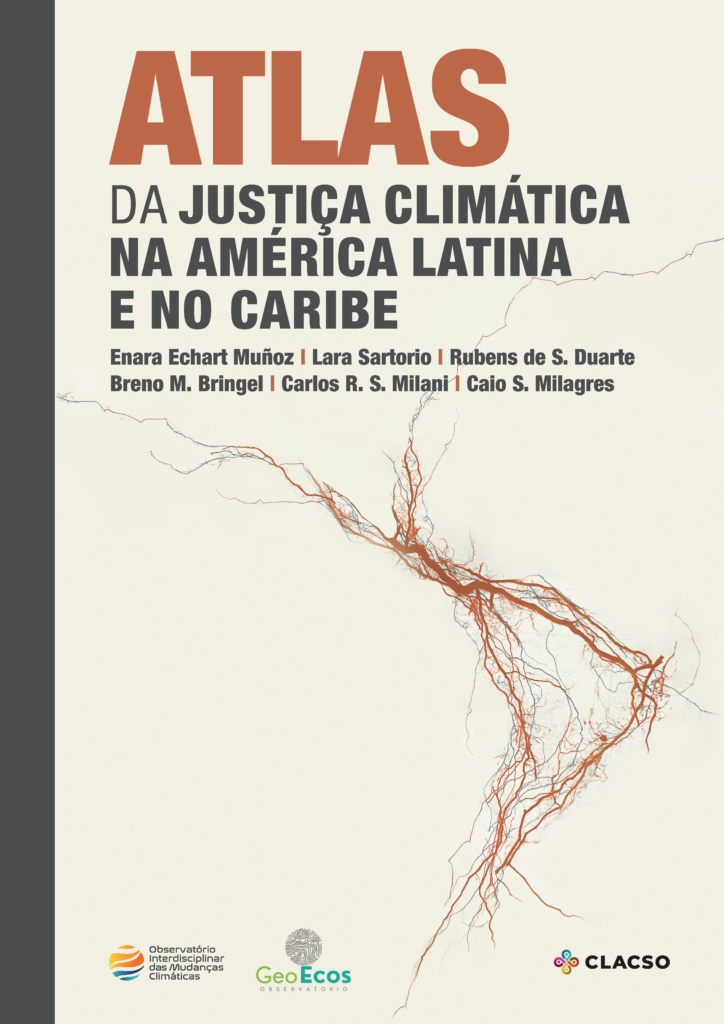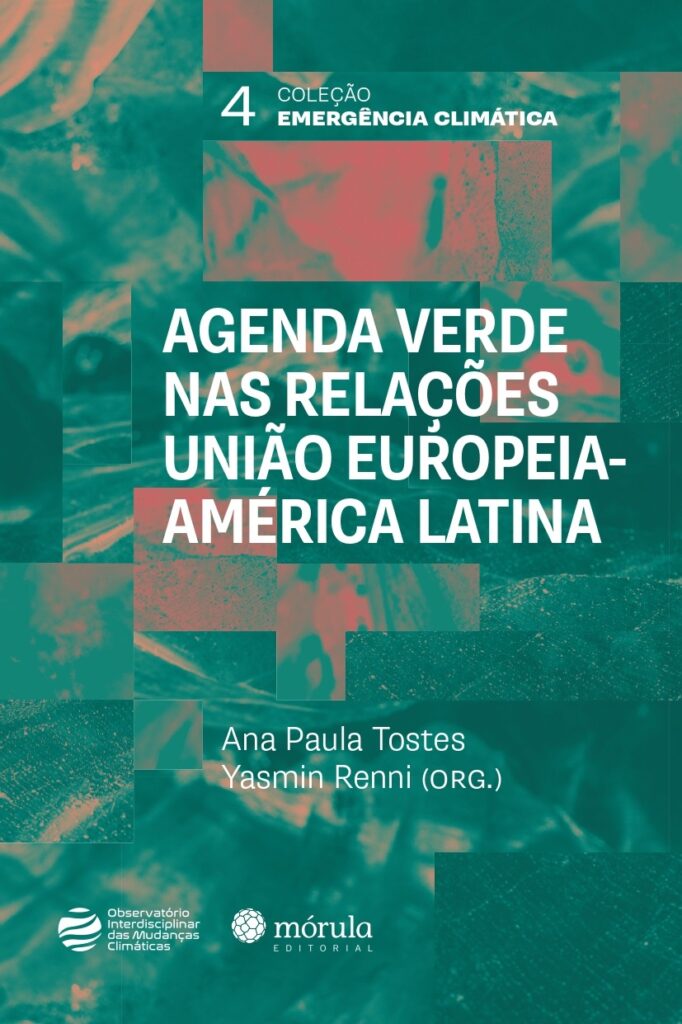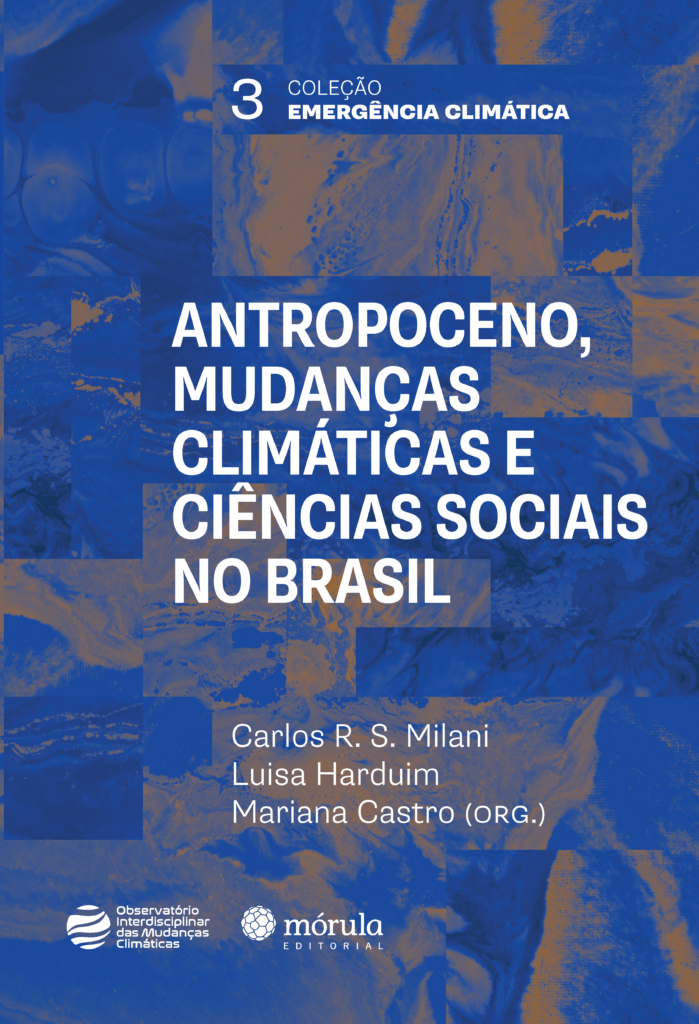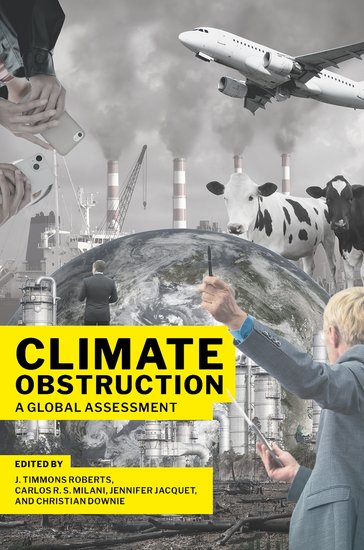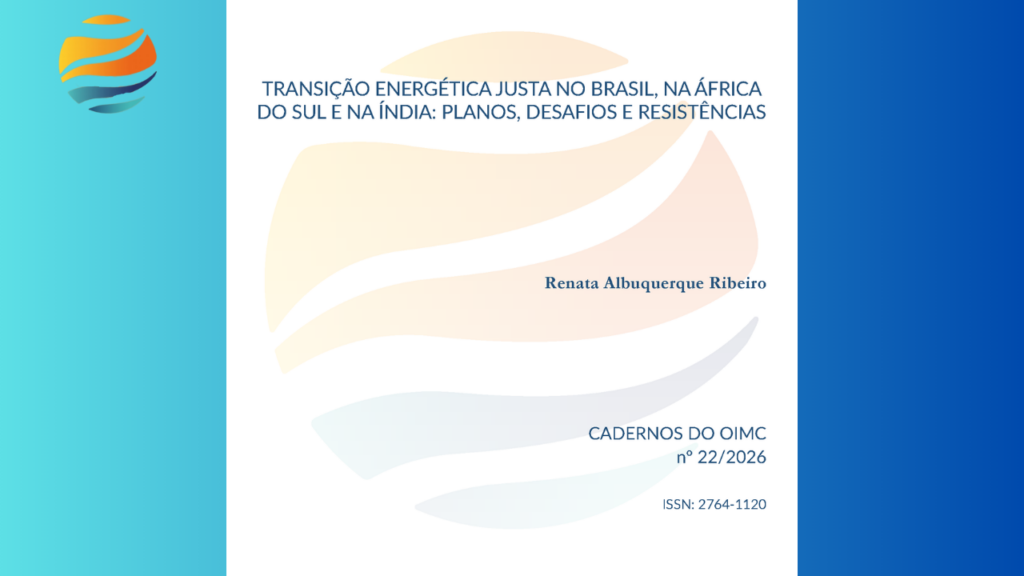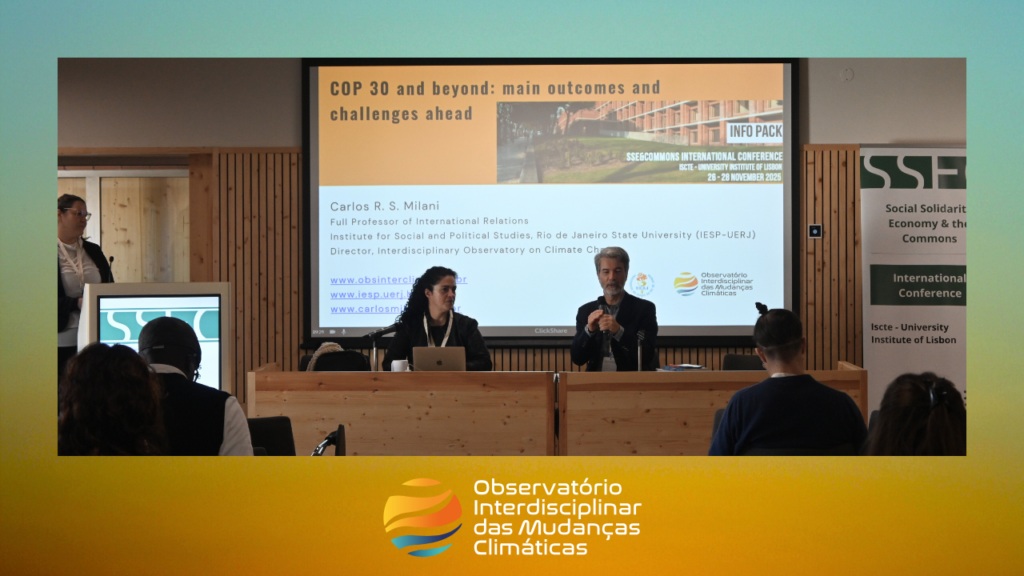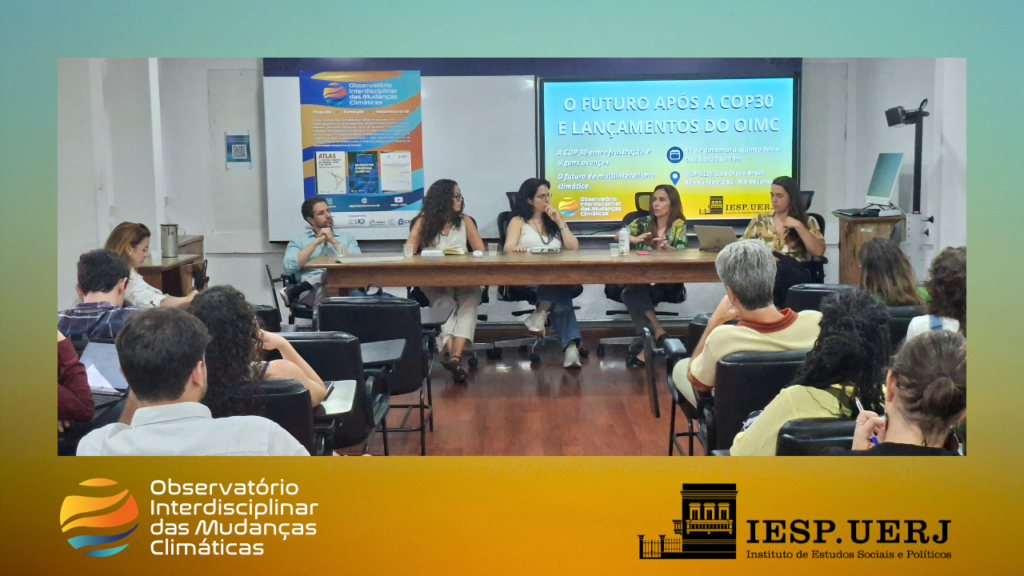Between 11 and 20 November 2025, in the city of Belém do Pará, the Interdisciplinary Observatory on Climate Change will team up with the City Laboratory and the Institute for Climate and Society (iCS) to promote a series of Roundtable Discussions at Casa da Cidade, an activity parallel to the 30th United Nations Climate Change Conference (COP30). With 18 on-site meetings at Casa da Cidade offered twice a day, always at 4 p.m. and 6 p.m., the initiative aims to establish a space for plural, horizontal and diverse dialogues on central themes of the climate agenda in general – and on conference negotiations in particular – between representatives of social movements, indigenous and quilombola communities, research centres, climate scientists, journalists, communicators, youth collectives and community leaders.
At the end of each day of discussions, always at 7:30 p.m., Casa da Cidade also offers events to mark the release of publications on topics relevant to the climate agenda, especially for the debates and negotiations underway during COP, followed by socialising cocktails for those present.
Read below the programme for the first week:
- 11 November, Tuesday:
4pm-5.30pm – Urban adaptation and climate resilience
| With: Lucas Nassar (City Laboratory), Mariana de Paula (Decodifica Institute) and Alex Soares (Palmares Laboratory-Action). Moderation: Leonildes Nazar (OIMC/iCS). This roundtable discussion aims to establish a dialogue able to mobilise technical knowledge, expertise and examples that contribute to approaches on how to leverage the implementation of the adaptation agenda and direct it as a vector of resilience, especially in urban areas, raising some questions: What is the role of civil society organisations in the climate adaptation agenda, particularly in the formulation of public policy prototypes? What are the main challenges within the institutional arrangements for implementing these agendas? |
6pm-7.30pm – The necessary convergence between socio-environmental movements and climate struggles
| With: Mattheus Silva (Paraense Youth Forum), Walter Kumaruara (Tapajônic Youth Collective/Climate Alliance of Peoples) and Beatriz Moreira (People’s Summit). Moderation: Mariana Castro (OIMC). This panel proposes a dialogue on the challenges faced by civil society environmental organisations, especially in the context of youth mobilisation and coordination with other issues. The conversation seeks to identify points of convergence between climate and socio-environmental agendas, reflecting on current development models and paths towards effective environmental justice. Based on the experiences of social movements, strategies for collective strengthening, political advocacy, and the construction of narratives that connect territory, climate, and rights will be discussed. |
7:30 p.m. – Release: Atlas of Climate Justice in Latin America and the Caribbean
| With: Rubens de S. Duarte (OIMC/LABMUNDO), Breno Bringel (IESP-UERJ/GeoEcos) and Carlos R. S. Milani (OIMC-UERJ). More on the publication |
- 12 November, Wednesday
4pm-5.30pm – Climate Finance: Where Does It Come From and Where Does(n’t) It Go?
| With: Lucca Rizzo (iCS), Kleber Karipuna (Articulation of Indigenous Peoples of Brazil), Marta Viegas (Director for Brazil and Suriname of the Inter-American Development Bank) and Gleiciane Pismel (Climate Alliance of Peoples). Moderation: Ana Paula Tostes (OIMC/Jean Monnet Chair). What is the landscape of climate finance around the world and especially in Brazil? What are the main challenges in mobilising private resources and why is this necessary? What is the role of multilateral development banks? How does the new global geopolitical landscape affect this situation and how might it affect the availability of resources for the Global South? |
6pm-7.30pm – Democratisation and Access to International Negotiations: Experiences of Young Climate Negotiators
| With: Jarê Pinagé (Engajamundo), Beatriz Triani (OIMC) and Marcelo Paixão (City Laboratory). Moderation: Hannah Balieiro (iCS). What are the main difficulties in participating in and following international climate negotiations? How have young activists been putting pressure on authorities in the negotiating arena? What are the main agendas that these activists are advocating for? |
7:30pm – Release: Green agenda in European Union-Latin America relations
| With: Ana Paula Tostes (OIMC/Jean Monnet Chair). More about the publication |
- 13 November, Thursday:
4pm-5.30pm – The Hydric Crossroads: Choices for a Fair Climate Future
| With: Ligia da Paz (Mandí), Mohema Rolim (Habitat for Humanity Brazil) and Andrew Leal (Baixadas Observatory). Moderation: Ana Carolina Melo (City Laboratory). Extreme droughts, floods and inequalities in access to water show that we need new forms of management. Nature-based solutions (NbS) point to concrete paths for adaptation and balance. What are the main challenges and injustices of the current water crisis? How can Nature-Based Solutions strengthen climate adaptation? What policies and decisions need to be made now to guarantee the right to water and life? How can we include traditional knowledge and communities in choices for a fair climate future? |
6pm-7.30pm – Release of report ‘De Olho no Transporte’
| With: Luiza Sampaio (Casa Fluminense), Ruth Costa (Paraciclo) and Maria Clara Salvador (Brazilian Centre for Climate Justice). Moderation: Larissa Amorim (Casa Fluminense). Casa Fluminense releases the fifth edition of the monitoring report De Olho no Transporte (Keeping an Eye on Transport), which will raise the debate on fair transition, air quality and fare free transport based on those most affected by the structural and emergency crisis in the sector: passengers. |
7:30 pm – Release: Anthropocene, Climate Change and Social Sciences in Brazil
| With: Mariana Castro and Carlos R. S. Milani (OIMC) More on the publication |
- 14 November, Friday:
4pm-5.30pm – Governing for the present: What does the city needs to (and can) be?
| With: Mariana Galdino (Decodifica Institute), Yara Martinelli (Brazilian Association of Municipalities) and Lucas Raiol (Lab.Pesquisa). Moderation: Anna Mathis (City Laboratory). This panel invites public managers, researchers, social movements and the public to reflect on the challenges and possibilities of urban action in the present day. The proposal is to discuss models of governance that respond to social, environmental and territorial urgencies, valuing innovative practices, local knowledge and policies that transform the city into a more just, sustainable and democratic space. |
6pm-7.30pm – Our Chance to Postpone the End of the World
| With: Marcos Wesley (COP-30 Committee), Diosmar Filho (Iyaleta), Anaís Cordeiro (Chico Mendes Committee) and Marcelle Oliveira (COP30 Youth Climate Champion). Moderation: Tatiana Lobão (iCS). This panel stems from the challenge launched by the COP-30 Committee to reflect on the role of civil society, territories and young people in developing urgent responses to the climate crisis. The conversation will bring together leaders, activists and researchers to discuss how to transform the sense of urgency into collective action, confronting development models that deepen inequalities and threaten the planet. Based on the question ‘how do we postpone the end of the world?’, the discussion will seek to highlight concrete experiences of resistance, coordination and social innovation that point to paths towards a transition with climate justice and people’s protagonism. |
7.30 pm- Release of The Earth revolves around an imaginary axis: Global Racial Scale in Nature Earth
| With Diosmar Filho (Iyaleta). Event to mark the release of the fourth volume of the Global Justice Pathways Collection, published by Justiça Global. |
- 15 November, Saturday:
4pm-5.30pm – Climate obstruction in Brazil and around the world
| With: Timmons Roberts (Brown University/Climate Social Science Network), Carlos R. S. Milani (OIMC), Gave Cabral (Abaré/Intervozes) and Janaína Pinto (OIMC). Moderation: Nara Perobelli (iCS). This roundtable aims to address climate obstruction around the world and in Brazil. Some of the topics covered are: who are the main actors that deny, delay and block the climate agenda? What strategies and narratives do they use to mobilise support? How do they coordinate? How do political economy and local contexts influence the dynamics of obstruction in the Global North and South? What are the ways to tackle it? |
6pm-7.30pm – Integrity of climate information
| With: Mariane Castro (Marajó Observatory), Thaís Lazzeri (Fala Agency) and Danielle Moreira (JUMA). Moderation: João Paulo (Tapajós de Fato). The main challenges in combating fake news; communication resources to raise awareness, engage and inform about the climate crisis; actions against Big Tech and the main channels of disinformation; how does the issue of disinformation fit into the climate litigation agenda? |
7.30 pm – Release: Climate Obstruction: A Global Assessment
| With: Timmons Roberts (CSSN) and Carlos R. S. Milani (OIMC) More on the publication |
The entire programme for the Roundtable Discussions at Casa da Cidade is the result of curatorship and organisation by the City Laboratory, the Interdisciplinary Observatory on Climate Change and the Institute for Climate and Society. Participation in each event will be determined on the basis of arrival, with no prior registration required. Casa da Cidade is located at Travessa Rui Barbosa, 257 (Reduto) – Belém (PA).
